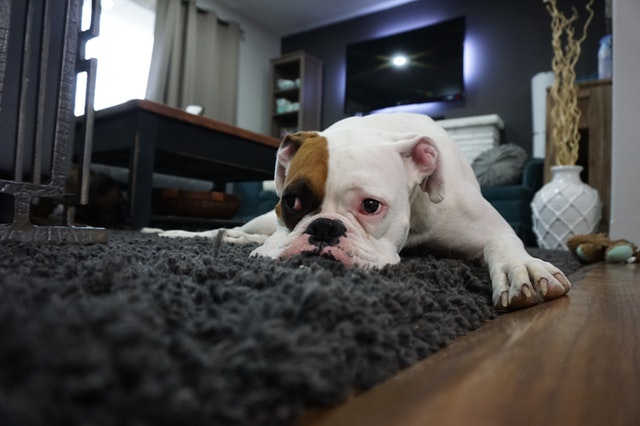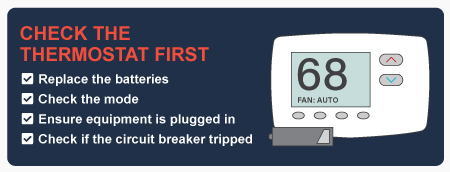
You’re relaxing at home when you notice something doesn’t seem quite right. Perhaps you don’t feel as comfortable or the hum from your HVAC system stopped. While heating and cooling equipment is reliable with regular maintenance, malfunctions happen. HVAC troubleshooting may help you find the source of your problems. Depending on the situation, you might be able to fix it on your own. However, there are some instances in which you should call a licensed HVAC contractor to complete the repair to ensure your safety and longevity of the equipment.
Tips for Common Residential HVAC Problems in Portland

Problem: The HVAC system stopped working
When the system shuts down, check the thermostat first. The batteries might be dead. If you replace the batteries and still have no luck, ensure the thermostat is set to the correct mode and set-point temperature.
If you still have problems, ensure the heating and cooling equipment is plugged in and see if the circuit breaker tripped. Flip it to the “on” position if it did. Call a HVAC specialist if your efforts don’t seem to make a difference.
Problem: The air feels too warm or too cool
Start with simple HVAC troubleshooting by ensuring the thermostat is set to the correct settings. During winter, set it to the “heat” mode. In the summer, it should be in the “cool” mode. If you haven’t changed the filter in more than a month, replacing it might help. Also, verify that the area around the HVAC system is clear and free of debris.
The thermostat temperatures you set should trigger the HVAC to turn off and on. If the set-point temperature is set too low during the winter (e.g., you set the thermostat to 65°F but the ambient temperature is 67°F), the system might not turn on. The same is true during the summer if the set-point temperature is higher than the ambient temperature. If you’re experiencing problems during the winter, set the temperature 5°F warmer than usual. In the summer, set it 5°F degrees cooler. If you don’t feel warm or cool air blowing from a register in your home, call a professional.
The temperatures in your home may also feel off if there’s a leak in the ductwork or refrigerant levels are low. Both situations require the expertise of an HVAC specialist.
Insufficient insulation and weather stripping, older windows, cracks in walls, and other items that affect the building may cause areas of a home to feel too warm or cold. Something similar may occur if the HVAC registers in your home are closed or blocked with furniture and personal belongings.
Problem: The air seems dusty or humid
Change the air filter if you haven’t done so in more than a month. If the problem persists, the ductwork might need to be cleaned and inspected for leaks. If the equipment is older and dust or humidity seems like a chronic problem, you might need a replacement.
Problem: The fan continuously runs or doesn’t run at all
If the fan is on all the time and you have a newer HVAC system, check the thermostat’s fan settings. You’ll find two options: auto and on. If the fan is set to “on,” it will run all the time. Changing the setting to “auto” will make the fan turn on as needed.
If the fan doesn’t turn on at all, the belt in the blower motor might be cracked or broken. Call an expert for help.
Problem: The heat pump or A/C has ice on it
During the winter, it’s normal to find a bit of snow or frost on a heat pump, depending on the weather. If it’s encased in ice, its coils might be blocked, causing the unit to not defrost properly. As soon as you notice the problem, turn off the system and call an expert. Do not try to melt or chip off the ice.
If you find ice on or in the heat pump or A/C during the summer, the cooling temperature might be too cold on the thermostat. Try raising the temperature above 70°F. Ensure the registers in the home are open and unblocked. Replace the air filter if more than a month has passed since the last replacement. Close any open windows. If this doesn’t seem to help, turn off the system and call an expert.
HVAC troubleshooting may help you save some money when the problem is simple to fix on your own. It’s also effective at helping you communicate the issues you notice when you talk to an HVAC specialist. Before tackling common HVAC problems that are more involved than replacing dirty filters or gently cleaning the exterior of a unit, refer to the equipment’s warranty. While a repair might seem simple to perform on your own, it might accidentally void the warranty if you don’t hire a licensed contractor to complete the work. As soon as you realize the issue with your HVAC system is beyond your expertise or requires professional attention, call AAA Heating and Cooling to prevent the inconvenience from becoming a more expensive headache. Schedule your free estimate today.